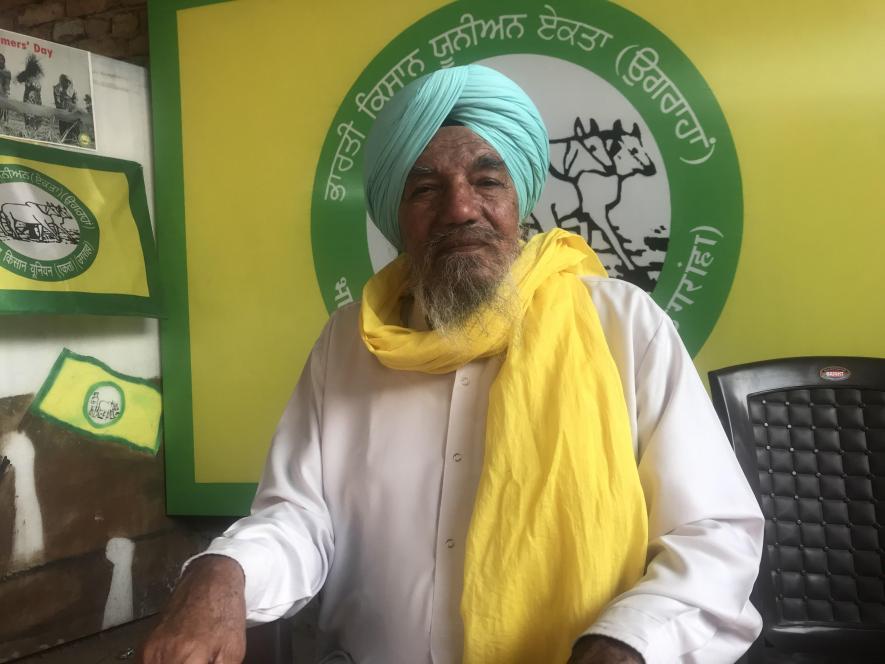Repeal of Two Laws, Putting on Hold Other One Could Have Us Shift from Delhi—Joginder Singh Ugrahan

Joginder Singh Ugrahan
On the Delhi-Haryana border at Tikri, a mini-township has emerged over the last 100 days, with rows and rows of tractor trolleys turned into dwelling units, and men and women sitting around talking or attending to chores such as cooking. For a few hours daily, they troop down to earmarked sites where speeches are made and slogans shouted demanding the withdrawal of the three new farm laws.
When they had descended on Delhi in November, their camping out in the wintry nights was taken as a testament to their forbearance and zeal to compel the Modi government to repeal the three news laws. Ask them when they intend to leave Delhi and their answer, articulated with passion, still is: “After the laws are repealed.”
Yet, their battle against the government has been deadlocked. The protesting farmers are as adamant as the government is in this desultory test of wills. Is there a way to break the stalemate? What concessions could the government give to farmers to have them return to their pinds, or villages, in time to harvest the Rabi crop in April?
NewsClick spoke to Joginder Singh Ugrahan, who heads the Bharatiya Kisan Union (Ekta-Ugrahan), which is the biggest of farmer unions in Punjab—and represents the interests of small and marginal farmers. He said government officials are informally talking to union leaders, including him. In this interview, Ugrahan charts out the contours of the solution that could have farmers shift out from Delhi to their states, from where they can wage their battle against the State facilitating the corporate takeover of agriculture.
After camping for over 100 days in Delhi, has not the battle of farmers against the Union government reached a stalemate?
When we began this movement, we knew it would necessarily be long-drawn. We knew that just by coming to Delhi, the movement will not enable farmers to realise all their goals.
Why do you say that?
When we [his union] pick up an issue, we try to track its root, from where it germinated, and for how long we will have to fight to resolve it.
From where did the three new farm laws germinate?
The three new farm laws are not just about [Prime Minister Narendra] Modi. In the 2013 WTO [World Trade Organisation] meeting at Bali, Indonesia, the developed countries had asked India to dismantle the Food Corporation of India and the system of Minimum Support Price for procuring foodgrains. These laws in India should have been framed much earlier.
In 2020, under the cover of the Coronavirus pandemic, the Modi government enacted the three laws we are opposing today. These laws are extra-Constitutional because the Union government has legislated on what is a state subject. These were also passed in a hurry, without a proper discussion. Any [legislative] work undertaken in a hurry is dogged by mistakes. The government has accepted that the three laws are faulty.
Why do you say that the government has accepted the laws are faulty?
During our meetings with the government, we were asked to point out the problems in the laws. The government’s mistake was to create a parallel private market, that too by waiving the 8.5% tax that is imposed on sales in government mandis, we pointed out. The parallel market has been created because the government wants to escape from the responsibility of procuring foodgrains from the mandi, which will get dismantled in due course.
Did the government explicitly accept its mistake?
In just one day we proved to them why the laws were a mistake. It is then they spoke of amendments. You amend something only when it is faulty or wrong. You say this is a mobile [pointing to a mobile lying on the table], I say, no, it is a calculator. No, you argue, it is a mobile. I show you that the mobile does have the function of the calculator. So you admit, yes, the mobile can be used as a calculator. Is not your position different from the one you had taken earlier? Likewise, the government changed its position [that the laws are beneficial to farmers and flawless] and agreed to amend the laws. But why should we accept the laws that the government has accepted are faulty and wrong?
That is because the negotiations between farmers and the government have been deadlocked.
Well, the government told us that they would carry out amendments and put these laws on hold for a year and a half.
Some say the government is willing to put the law on hold for three years.
Whether a year and a half or three years, we do not have anything in writing.
Has the government given you in writing that it is willing to amend the laws?
They have given nothing in writing yet. They should give us a pro forma paper spelling out which of our demands they have accepted.
When is the next round of talks scheduled?
Only the government and the media would know. But yes, unofficial talks are underway. Only today, I received a call telling me that a very senior official wanted to meet me. Around a week ago, another official met me. If they are meeting me, they would be meeting others as well. I suppose they are meeting each [leader of farmer unions] to find a solution.
When will official talks be held?
The problem is that there are many groups in the movement. From Punjab and elsewhere, there are in total 55 unions. It is very difficult for all 55 unions to have a common position. But the government should give us an informal proposal [with details of] what is the maximum they can give us. If they say they will put the laws on hold for a year and a half, it is possible they will agree to do so for three years. Or, it can say they will repeal one of the three laws or two of them and put the third on hold.
Once they tell us this, we can go to our people and say we are not ending our movement. Rather, we are ending the one in Delhi to prepare for a bigger one in the future. The andolan or movement will continue. There cannot be an understanding with the government to end the farmer movement in the future as well. We want all three farm laws repealed, but the movement in Delhi can be changed, given a new shape. We can shift this movement elsewhere. This is our union’s position.
Every movement has a limit. One form of movement cannot realise its final goal. We were in Punjab, then we came to Delhi, then it acquired an all-India character. By camping in Delhi, we extracted some concessions [such as the government’s acceptance that the laws are faulty.] We have now fanned out into other states.
If this is so, then when the government said in December that you can propose amendments, why did you all not agree?
We are not ready for amendments even now.
Okay, so what you want is that the laws should be put on hold, plus you want the repeal of one or two of the laws?
Yes. Accepting the laws after some amendments is not an option for us.
Your replies indicate the farmer movement will continue until 2024. So, what will be the movement’s goal?
We do not want the corporatisation of the agriculture sector.
Will your cadres accept a compromise that does not lead to the repeal of all three laws, but only one, and putting the others on hold?
Yes, they will.
We went around talking to people before meeting you. They do not seem willing to leave Delhi without getting the three laws repealed.
This is something that we have to convince them about. If you ask them, they will, of course, say that they will not return until the laws are repealed. This is not their fault, because we [leaders] say this from the stage. Suppose we get two laws repealed and one put on hold, we can then explain to people why we have done that. We hold internal meetings, in which we say that it is difficult to get 100 percent marks on a test. A score of 85 or 80 percent is a good result. It is not that we do not want the extra 20%. But to achieve that we have to take another test paper for another time.
Is it that you feel 80% is a possibility today—and may not be an option available tomorrow?
It is not as if we have got 80%. I am simply giving you an example. Decisions in a movement must take into account the circumstances and conditions. Assessing the situation and taking a call is the work of those who lead a movement.
If the three farm laws are not repealed and the protest in Delhi is called off, will not the Khalistanis and right-wing groups exploit the situation? They will say, ‘Look, the leaders have compromised?’
They tell us, ‘Take milk, take water, but dare not return from Delhi without getting the three laws repealed.’ One even said in an interview that if we returned without getting the three laws repealed, then we would meet the same fate as [Akali Dal president] Sant Longowal [who was assassinated for signing the Punjab Accord with the Centre]. We also belong to the Sikh community. We are not cowards.
We will tell the people exactly what we have achieved through our movement—and how much we still have to attain, for which we will continue to struggle. The battle for our rights does not end, only its form will change. As long as our cadres agree, we are not bothered about what others say.
Some suspect the government is encouraging right-wing elements in Punjab. Will anything short of repealing the three laws boost these elements?
There is no room for doubt that Khalistani can threaten the farmer movement. But the movement has acquired such strength that the Khalistanis cannot go alone. They will not survive. Our union alone can gather as many people who are protesting at all the five sites of protest in Delhi. Khalistanis do not have a chance.
Any understanding with the government has to be with the consent of all other unions?
Regardless of what we get or do not get, our paramount concern is that just as we came here united, we should also return united.
Out of the three laws, if you were asked which should be repealed first, what would you choose?
I will choose the one relating to the Agriculture Produce Marketing Committee (APMC). That is because it is the government’s attack on the existing market.
It has been 100 days of the farmers’ protesting, what plan of action do farmers have?
We are thinking of a human chain although what final shape it will have we cannot say right away. If we are to create a human chain then we will have to think about linking it from Kanyakumari to here. Can we do it or not? We can always pull off one from Amritsar to Delhi; but a chain should link people of the entire country, from East to West and North to South. It should be a chain emerging from all sides of the country, and that is when it will have an effect. I think we can create momentum for such a human chain.
You want the system of procuring foodgrains in Punjab and Haryana should continue as is?
There cannot be a parallel market [as envisaged under the Promotion and Facilitation of Trade and Commerce Act]. The one dealing with contract farming [Price Assurance and Farm Services Act] is no less important. Its provisions defining services are very dangerous.
Why?
With whosoever we farmers have a contract that company will supply us inputs—seed, fertiliser, pesticide, etc. So farm inputs will be under the company’s control. This means existing retail stores will go out of business [as they will be unable to countenance the competition from corporate giants]. Under the contracts, the foodgrains we produce will also go to the same company, so it will become the owner of our produce as well.
So the company will provide inputs and take the output, meaning it will also determine prices?
Yes. The Essential Commodities Act, 1955 gives the government the authority to store as many foodgrains as it wants. That authority to store will now be with the company. It will become the principal determinant of the nation’s food security. The Public Distribution System will wither away. The poor will suffer.
Don’t you think the government has extended negotiations because the farmer movement has been confined to Punjab and Haryana and only recently spilled into west Uttar Pradesh? The government, perhaps, feels the movement will not have an adverse electoral impact.
Have you seen wrestlers fight in akhadas? Once in a while, it happens that the stronger wrestler is pinned to the ground and the weaker one sits astride him. Then, suddenly, the stronger wrestler topples the weaker one. Peaceful [or nonviolent struggle] is our only weapon, because of which the government’s tactics to break the movement have failed.
This government is a phasiwadi hukumat [a colloquial phrase to describe authoritarian rule], egoistical and communal. Yet we failed its attempts to weaken the movement. Who knew about these laws? We made the people aware of its inimical effects.
But the movement has failed to penetrate electorally significant states like Bihar and Uttar Pradesh, barring its western part.
It is happening in east Uttar Pradesh. It is happening in Rajasthan, where I have already conducted two meetings.
You have been part of the farmer movement since 1982. At which stage do governments agree to give in to the demands raised by protesters?
The government’s greatest weakness is its kursi—seat of power—or the fear of losing it. When a government feels its power is threatened, it gives in.
Why should the Modi government feel threatened? After all, Punjab sends 13 MPs, Haryana 10, western Uttar Pradesh around 29. The Bharatiya Janata Party would feel it can live with such losses, particularly as it can win some of these seats by polarising voters against farming communities.
Do business tycoons accept even a loss of one paisa? Their mentality is such that even when they rake in a crore a day they will not accept a revenue loss of Rs. 1,000 for a day. This is true of political parties, too. It hurts them to lose even a single vote. You and I can say Punjab has only 13 seats, Haryana only 10… Politicians die for even a vote. For them not to get a seat is a sign of weakness. The BJP was washed out in Punjab’s municipality elections, which did not, obviously, mean the party losing power at the Centre. But the BJP did not like the municipal election results one bit. We have breached the BJP’s fortress. I assess that the longer our movement persists, the bigger will be the fissures inside the BJP. Even if they do not take back the laws, we will not be as affected as they will be.
Why do you say that?
What can those who do not have much lose anyway? We only want roti twice a day. Our fields provide that. If I do not have roti and you have, I will request you to share it with me. If you do not, my hunger will have me snatch it from you. No person can endure hunger. He will demand bread, he will come on the streets, and if his demand remains unmet, he will take to stealing. That is why I say, those who participate in a movement stand to only gain.
What did those who protested against the Citizenship Amendment Act gain?
Has the government implemented the CAA?
No, it has not. But so many protestors were packed off to jail, as also have been those for the 26 January incident…
Just because protestors are sent to jail does not mean their movement has failed.
Have you been to jail?
I think around two dozen times.
What was your longest stint in jail?
Two months, because of the farmer movement we launched against land being allocated to Trident.
How many FIRs have been filed against you?
Not too many, around two dozen times. [Laughs]
Is there a special reason why farmers in Punjab are agitating more than in other states?
Punjab is distinct from other states in terms of awareness. The state has a tradition of agitation, and its agrarian economy is broken. Besides, the youth who are engaged in agriculture has no prospects. And when desires remain unfulfilled, both parents and their children become disappointed.
Is this happening in Punjab?
Yes, it is. There are no jobs in the cities. Public sector and government jobs are being finished off. Railways, coal, mining, ports, airports, bus services, phones, LIC, banks—what is left in the public sector? Nothing. If I have two children and educating them, they cannot revert to farming. They will seek private or contractual jobs that do not pay enough to live on. This is the reason for their dejection. Rebellions are born from this dejection.
Get the latest reports & analysis with people's perspective on Protests, movements & deep analytical videos, discussions of the current affairs in your Telegram app. Subscribe to NewsClick's Telegram channel & get Real-Time updates on stories, as they get published on our website.
























